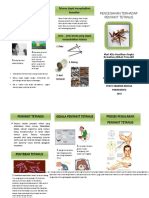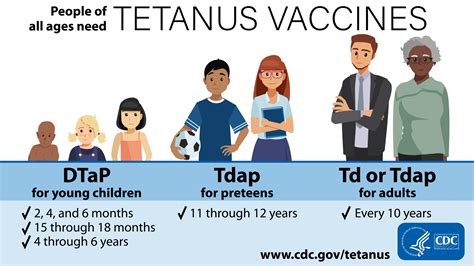Intro
Discover 5 crucial facts about Tetanus Jab, including symptoms, vaccination schedules, and prevention methods, to understand the importance of this lifesaving inoculation against Tetanus infection and boosters.
Tetanus is a serious bacterial infection that can cause muscle stiffness, spasms, and rigidity, and can be life-threatening if left untreated. The tetanus jab, also known as the tetanus vaccine, is a crucial preventive measure against this disease. Here are five essential facts about the tetanus jab that you should know.
The tetanus jab is a highly effective way to prevent tetanus infection, and it is usually administered in combination with other vaccines, such as diphtheria and pertussis. The vaccine works by stimulating the body's immune system to produce antibodies that can fight off the tetanus bacteria. This means that if you are exposed to the bacteria, your body will be able to recognize and attack it, preventing the infection from taking hold.
One of the most significant advantages of the tetanus jab is that it provides long-term protection against tetanus infection. The vaccine is typically given in a series of doses, with booster shots administered every 10 years to maintain immunity. This means that once you have received the full series of vaccinations, you will be protected against tetanus for many years, reducing your risk of contracting the disease.
What is Tetanus?

How Tetanus Jab Works
The tetanus jab works by introducing a small, harmless piece of the tetanus bacteria to the body, which stimulates the immune system to produce antibodies. These antibodies can then recognize and attack the tetanus bacteria if you are exposed to it in the future, preventing the infection from taking hold. The vaccine is made from inactivated toxins, which means that it cannot cause the disease itself, but can still stimulate an immune response.Benefits of Tetanus Jab

Some of the key benefits of the tetanus jab include:
- Long-term protection against tetanus infection
- Reduced risk of complications and death from the disease
- Safe and well-tolerated, with few side effects reported
- Important preventive measure for people who work with animals or engage in outdoor activities
- Can be administered in combination with other vaccines, such as diphtheria and pertussis
Who Should Get Tetanus Jab
The tetanus jab is recommended for everyone, regardless of age or health status. However, some people may be at higher risk of tetanus infection, and may need to take extra precautions to protect themselves. These include: * People who work with animals, such as farmers or veterinarians * People who engage in outdoor activities, such as gardening or hiking * People who have a weakened immune system, such as those with HIV or cancer * People who have not been vaccinated against tetanus in the past 10 yearsSide Effects of Tetanus Jab

In rare cases, the tetanus jab can cause more serious side effects, such as an allergic reaction or a neurological disorder. However, these side effects are extremely rare, and the benefits of the vaccine far outweigh the risks.
Tetanus Jab and Pregnancy
The tetanus jab is safe to administer during pregnancy, and is actually recommended for pregnant women who have not been vaccinated against tetanus in the past 10 years. This is because tetanus infection can be particularly serious during pregnancy, and can increase the risk of complications and death for both the mother and the baby.Boosters and Follow-Up

Some key things to keep in mind about boosters and follow-up include:
- Booster shots are typically administered every 10 years
- Booster shots can be administered in combination with other vaccines
- It is essential to keep track of your vaccination schedule to ensure that you receive booster shots on time
- If you are unsure about your vaccination schedule, consult with your healthcare provider
Common Misconceptions
There are several common misconceptions about the tetanus jab that can discourage people from getting vaccinated. These include: * The tetanus jab is only necessary for people who work with animals or engage in outdoor activities * The tetanus jab is not effective in preventing tetanus infection * The tetanus jab can cause serious side effects, such as allergic reactions or neurological disordersHowever, these misconceptions are not supported by scientific evidence. The tetanus jab is a safe and effective way to prevent tetanus infection, and is recommended for everyone, regardless of age or health status.
Conclusion and Next Steps

If you have any questions or concerns about the tetanus jab, consult with your healthcare provider. They can provide you with personalized advice and guidance, and help you stay up-to-date on your vaccination schedule.
What is tetanus, and how is it transmitted?
+Tetanus is a bacterial infection caused by Clostridium tetani, which is commonly found in soil, dust, and the gastrointestinal tracts of animals. The bacteria can enter the body through wounds or cuts, and can produce toxins that affect the nervous system, causing muscle stiffness, spasms, and rigidity.
Who should get the tetanus jab, and how often should it be administered?
+The tetanus jab is recommended for everyone, regardless of age or health status. Booster shots are typically administered every 10 years to maintain immunity against tetanus infection.
What are the benefits and risks of the tetanus jab, and how can I minimize the risk of side effects?
+The benefits of the tetanus jab include long-term protection against tetanus infection, reduced risk of complications and death from the disease, and safety and tolerability. The risks of the tetanus jab include mild side effects, such as redness, swelling, or pain at the injection site, and rare but serious side effects, such as allergic reactions or neurological disorders. To minimize the risk of side effects, it is essential to follow the recommended vaccination schedule and consult with your healthcare provider if you have any concerns.
We hope this article has provided you with a comprehensive understanding of the tetanus jab and its importance in preventing tetanus infection. If you have any further questions or concerns, please do not hesitate to comment below or share this article with your friends and family. Together, we can promote awareness and education about the tetanus jab and encourage everyone to take steps to protect themselves against this serious disease.
